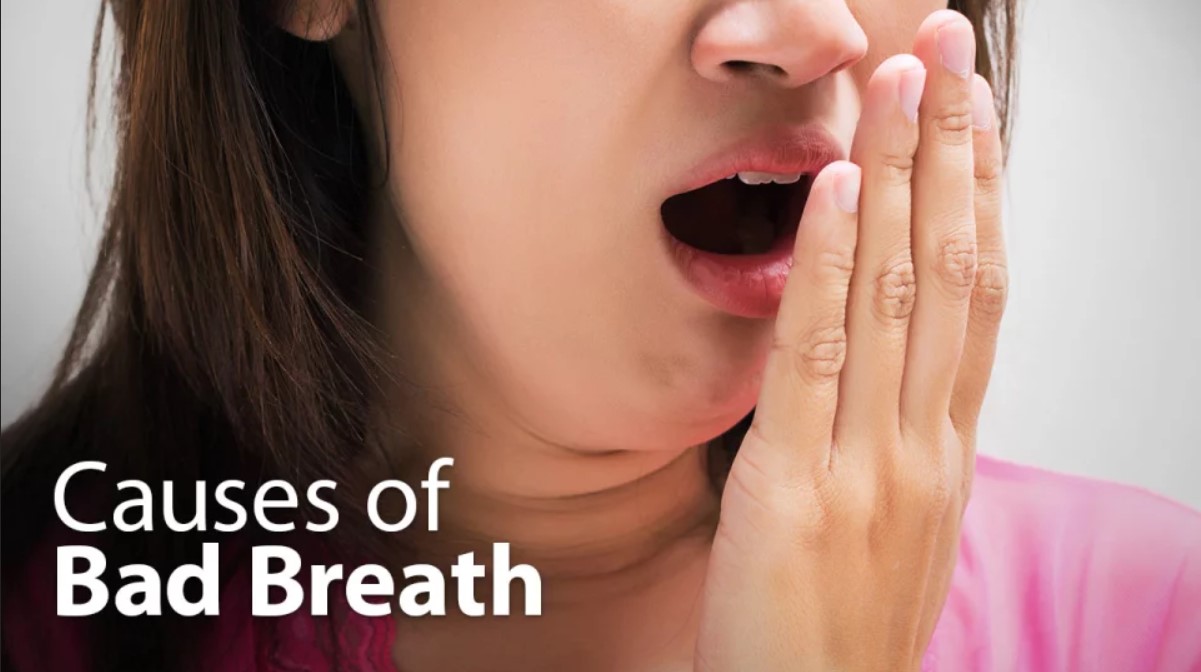Causes of Bad breath

Bad breath, also referred to as halitosis, can cause significant psychological distress and anxiety. It is the main reason why drug stores are flooding with mouthwashes, mints, and gums designed to fight halitosis. However, most of these products only act as a temporary solution because the main issue is not addressed.
Some of the main causes of bad breath include poor oral habits, certain foods, and various dental conditions. In most cases, proper dental hygiene can help improve your bad breath.
If you are experiencing bad breath that cannot be explained by bad oral hygiene habits such as smoking or what you ate or drank, one of these reasons may be the cause;
Lax oral hygiene
Bad breath results from bacteria in the mouth, so it’s important to make dental hygiene a priority. If you don’t floss or brush your teeth at least twice every day, food particles can accumulate in your mouth, causing bad breath. A film of sticky and colourless bacteria builds up around your teeth if you don’t brush regularly. Plaque irritates your gums and causes inflammation between the gums and teeth.
Bacteria can also be trapped by your tongue. Therefore, when brushing, do not forget to brush the tongue. Use a toothbrush or a tongue scraper that you can buy from the local store.
Gum disease
Gum disease is the infection of the gums that causes your gums to separate from the teeth. It occurs when food particles accumulate in your gums and teeth, forming tartar. If left unchecked, it extends below the gum line, causing an infection.
Keep your gums healthy by going for routine dental cleanings and exams. This allows your dentist to monitor your gum’s health.
Aggressive dieting
Bad breath can result from weight loss dieting, especially when you increase proteins and reduce carbohydrates.
Carbohydrates play a significant role in the body. When your body doesn’t get enough carbs due to aggressive dieting, your body’s metabolism changes, causing bad breath. Foods high in proteins release sulphurous gases making it hard for the body to digest them. The excessive burning of fats produces chemicals with a strong aroma called ketones.
Incorporate more herbs and vegetables into your diet to make it more nutritious and balanced. Also, try drinking more water if this is the case.
Allergies and sleep apnoea
Sleep apnoea is a sleep disorder that causes the airways to collapse, resulting in restrictive breathing. People with sleep apnoea may breathe through their mouth at night, leading to a dry mouth.
Saliva cleans your mouth by removing food particles that cause bad breath. When the production of saliva decreases, oral bacteria increases resulting in halitosis.
Seek treatment if you suffer from a condition that makes breathing through the nose difficult.
Medications
The side effect of numerous prescription medications is dry mouth. Saliva production decreases when your mouth is dry, causing bad breath. Besides, some prescriptions release chemicals when broken down in the body that travels through the bloodstream to your breath.
If this is the case, try chewing sugar-free gum to enhance saliva production if a change in medication is not possible. You can also talk to your dentist about an over-the-counter prescription remedy for dry mouth.
Bottom Line
Halitosis is a common problem that affects most people. Simple home remedies such as proper dental hygiene and eating a balanced diet can help you avoid the issue.
Everybody gets bad breath once in a while, but if it happens to you more than you like, you must inform your dentist. Visit us at Springvale Dental Clinic and we will help you solve the problem once and for all.
